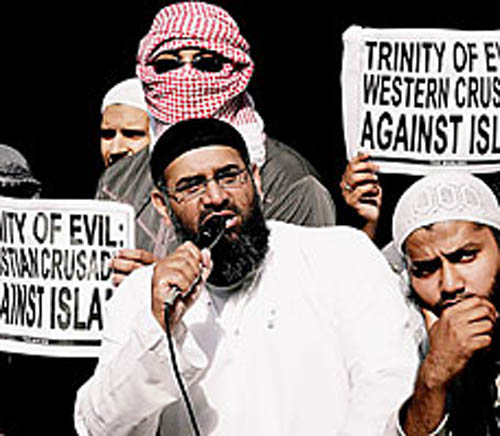
Nearly every religion that has ever existed believes that it has the ultimate truth. Jihadism, however, is another in a long line of religions that indicate how that claim can go very wrong when it forgets that people have a right to choose what they believe the truth to be.
You probably didn't know that there exists a dramatic controversy as to whether the truth of Islam should be a requirement for everyone. Since perhaps the 1970's, when Middle Eastern Studies departments of various universities became co-opted by easy money from those who didn't want the truth to get out, it's been very difficult to see the juxtaposition of moderate Muslims with radical Muslims.
Why do you never (at least seldom) hear moderate Muslims speak out against Jihadist Islam? Because the radical Muslims cannot afford to have you know that there is a controversy. They cannot have you know two realities:
1. That radical Islam seeks the subjugation of all peoples, and that it will not be content simply for the United States military to leave Middle Eastern soil. Claims to the contrary are simply convenient smoke screens.
2. That moderate Islam seeks liberty, freedom of choice, and democratic representation for people of all religions.
This is why it is so important, as I have written recently, to "Free the Film".
Jihadists claim to be under attack everywhere--not just by the United States. Radical Muslims attack nearly everywhere as well--not just against the United States. But more importantly, radical Muslims claim to be under attack from Muslims who disagree with them. Their most concentrated and methodical attack, therefore, must be against moderate Muslims who do not agree with them. They claim, therefore, that not all those who claim to be Muslims really are islamic. Like Nazis and Communists, they can brook neither dissent nor even discussion from the moderates of their faith, because if the moderates are proven right, Jihadism as an ideology will have been proven to be an utter failure and a fraud.
The church that I belong to--The Church of Jesus Christ of Latter-Day Saints--believes that, although other churches have some truth, it contains the entire truth, or at least the ability to understand that truth through ongoing revelation from God. We also believe, though, that every person is free to choose whether or not to believe the Church's teachings. Coincidentally, I have reason to believe that this is a similar concept of truth to what Muhammad taught with regard to Islam.
Nearly every religion teaches that it has the market cornered on truth. Islam teaches this. Catholicism teaches this. So do all the Protestant offshoots of Catholicism. I'm reasonably sure that most of the Oriental religions teach the same concept.
I once had a discussion with a friend about wars and history. He commented that all wars and oppression are religion-based. I suggested that Communism was responsible for more deaths than all wars combined. His reply was that Communism is a religion in and of itself. Semantically, he has a point, but his point obfuscates the reality that true religion believes that men are free to choose what they will be and believe.
In a way similar to Communism, Nazism, and the other political -isms, the Catholic Church developed a totalitarian nature in what we now know as the Dark Ages. Interestingly, Islam went through a phase of similar totalitarianism at about the same time. But whereas Christianity was able to correct its course, Islam has since been dominated by those who believe that because Islam is true, all people must be forced to believe it. Not even Muhammad taught that.




